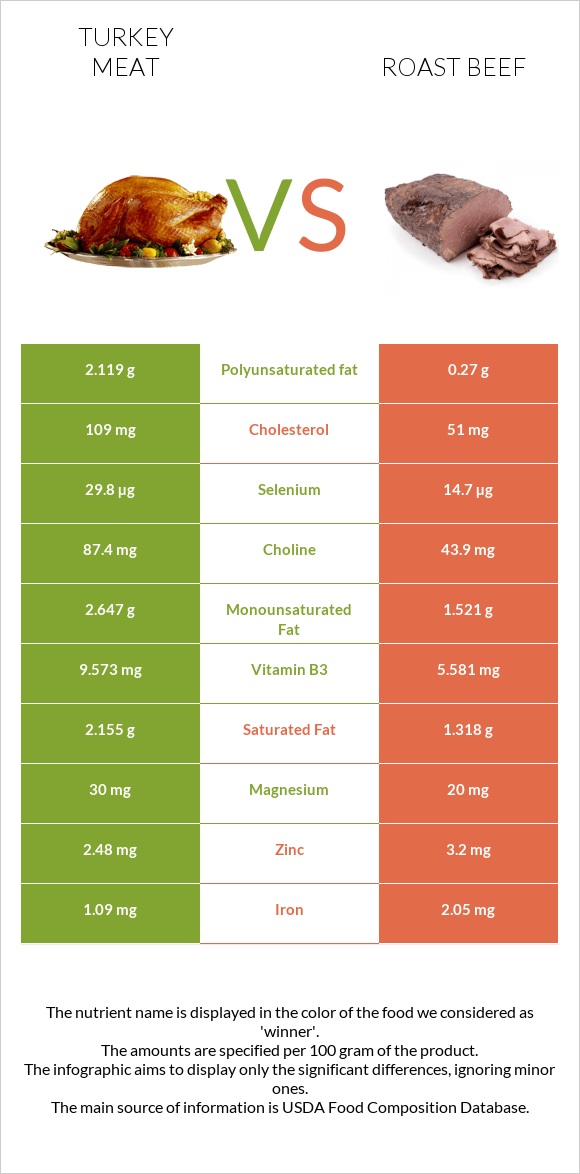Turkey meat vs. Roast beef — In-Depth Nutrition Comparison
Compare
How are turkey meat and roast beef different?
- Turkey meat is higher in selenium, vitamin B3, vitamin B6, choline, and vitamin B5; however, roast beef is richer in vitamin B12, iron, and potassium.
- Daily need coverage for vitamin B12 for roast beef is 43% higher.
- Turkey meat contains 2 times more cholesterol than roast beef. While turkey meat contains 109mg of cholesterol, roast beef contains only 51mg.
Turkey, whole, meat, and skin, cooked, roasted and Roast beef, deli style, prepackaged, sliced are the varieties used in this article.
Infographic

Infographic link
Mineral Comparison
Mineral comparison score is based on the number of minerals by which one or the other food is richer. The "coverage" charts below show how much of the daily needs can be covered by 300 grams of the food.
| Contains more MagnesiumMagnesium | +50% |
| Contains more CalciumCalcium | +180% |
| Contains less SodiumSodium | -87.9% |
| Contains more SeleniumSelenium | +102.7% |
| Contains more PotassiumPotassium | +170.7% |
| Contains more IronIron | +88.1% |
| Contains more ZincZinc | +29% |
Vitamin Comparison
Vitamin comparison score is based on the number of vitamins by which one or the other food is richer. The "coverage" charts below show how much of the daily needs can be covered by 300 grams of the food.
| Contains more Vitamin AVitamin A | +300% |
| Contains more Vitamin DVitamin D | +∞% |
| Contains more Vitamin B2Vitamin B2 | +31.9% |
| Contains more Vitamin B3Vitamin B3 | +71.5% |
| Contains more Vitamin B5Vitamin B5 | +67.5% |
| Contains more Vitamin B6Vitamin B6 | +33.9% |
| Contains more FolateFolate | +80% |
| Contains more Vitamin EVitamin E | +600% |
| Contains more Vitamin B12Vitamin B12 | +100% |
| Contains more Vitamin KVitamin K | +∞% |
All nutrients comparison - raw data values
| Nutrient |  |
 |
DV% diff. |
| Vitamin B12 | 1.02µg | 2.04µg | 43% |
| Sodium | 103mg | 853mg | 33% |
| Selenium | 29.8µg | 14.7µg | 27% |
| Vitamin B3 | 9.573mg | 5.581mg | 25% |
| Protein | 28.55g | 18.62g | 20% |
| Cholesterol | 109mg | 51mg | 19% |
| Potassium | 239mg | 647mg | 12% |
| Iron | 1.09mg | 2.05mg | 12% |
| Vitamin B6 | 0.616mg | 0.46mg | 12% |
| Polyunsaturated fat | 2.119g | 0.27g | 12% |
| Vitamin B5 | 0.948mg | 0.566mg | 8% |
| Choline | 87.4mg | 43.9mg | 8% |
| Zinc | 2.48mg | 3.2mg | 7% |
| Fats | 7.39g | 3.69g | 6% |
| Vitamin B2 | 0.281mg | 0.213mg | 5% |
| Calories | 189kcal | 115kcal | 4% |
| Saturated fat | 2.155g | 1.318g | 4% |
| Phosphorus | 223mg | 242mg | 3% |
| Vitamin E | 0.07mg | 0.49mg | 3% |
| Monounsaturated fat | 2.647g | 1.521g | 3% |
| Vitamin D | 15 IU | 1 IU | 2% |
| Magnesium | 30mg | 20mg | 2% |
| Vitamin D | 0.4µg | 0µg | 2% |
| Calcium | 14mg | 5mg | 1% |
| Copper | 0.093mg | 0.086mg | 1% |
| Vitamin A | 12µg | 3µg | 1% |
| Vitamin K | 0µg | 1.6µg | 1% |
| Folate | 9µg | 5µg | 1% |
| Net carbs | 0.06g | 0.64g | N/A |
| Carbs | 0.06g | 0.64g | 0% |
| Sugar | 0g | 0.29g | N/A |
| Manganese | 0.014mg | 0.015mg | 0% |
| Vitamin B1 | 0.045mg | 0.043mg | 0% |
| Trans fat | 0.101g | 0.148g | N/A |
| Tryptophan | 0.291mg | 0% | |
| Threonine | 1.004mg | 0% | |
| Isoleucine | 0.796mg | 0% | |
| Leucine | 1.925mg | 0% | |
| Lysine | 2.282mg | 0% | |
| Methionine | 0.724mg | 0% | |
| Phenylalanine | 0.903mg | 0% | |
| Valine | 0.902mg | 0% | |
| Histidine | 0.749mg | 0% | |
| Omega-3 - EPA | 0.008g | 0.007g | N/A |
| Omega-3 - DHA | 0.005g | 0.001g | N/A |
| Omega-3 - ALA | 0.105g | 0.017g | N/A |
| Omega-3 - DPA | 0.008g | 0.012g | N/A |
| Omega-3 - Eicosatrienoic acid | 0.001g | 0g | N/A |
| Omega-6 - Gamma-linoleic acid | 0.003g | 0.001g | N/A |
| Omega-6 - Dihomo-gamma-linoleic acid | 0.01g | 0.011g | N/A |
| Omega-6 - Eicosadienoic acid | 0.014g | 0.002g | N/A |
| Omega-6 - Linoleic acid | 1.841g | 0.14g | N/A |
Macronutrient Comparison
Macronutrient breakdown side-by-side comparison
Protein:
28.55 g
Fats:
7.39 g
Carbs:
0.06 g
Water:
63.52 g
Other:
0.48 g
Protein:
18.62 g
Fats:
3.69 g
Carbs:
0.64 g
Water:
73.72 g
Other:
3.33 g
| Contains more ProteinProtein | +53.3% |
| Contains more FatsFats | +100.3% |
| Contains more CarbsCarbs | +966.7% |
| Contains more WaterWater | +16.1% |
| Contains more OtherOther | +593.8% |
Fat Type Comparison
Fat type breakdown side-by-side comparison
Saturated fat:
Sat. Fat
2.155 g
Monounsaturated fat:
Mono. Fat
2.647 g
Polyunsaturated fat:
Poly. Fat
2.119 g
Saturated fat:
Sat. Fat
1.318 g
Monounsaturated fat:
Mono. Fat
1.521 g
Polyunsaturated fat:
Poly. Fat
0.27 g
| Contains more Mono. FatMonounsaturated fat | +74% |
| Contains more Poly. FatPolyunsaturated fat | +684.8% |
| Contains less Sat. FatSaturated fat | -38.8% |





